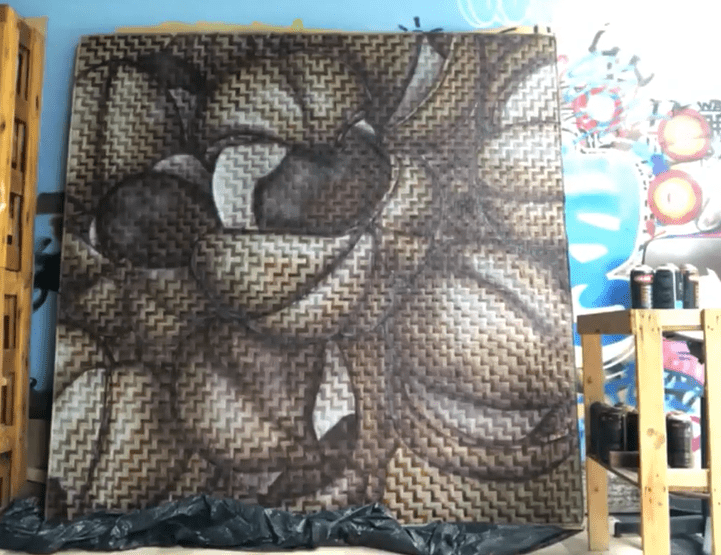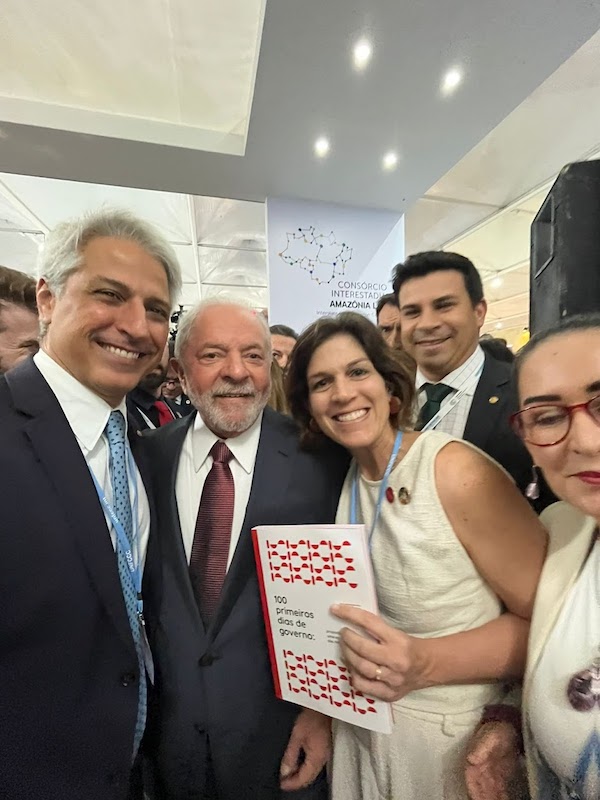The appreciation and dissemination of the sociocultural richness of the Amazon region were also present in the work developed in real time by the Amazonian artist Raiz Campos. Inspired by the Meeting, he created graffiti on an indigenous mat made with arumã fibers by artisans from the Baré ethnic group, in which he illustrated guarana seeds, which “is the fruit that brings this energy and vigor to our people”.
“This year was very emblematic for us”
There were six meetings, two of which were face-to-face in the territory. We had the launch of the document “100 First Days of Government: Proposals for an Integrated Agenda of the Amazons”, in partnership with Estadão and RAPS – Political Action Network for Sustainability and Estadão, with an audience of over 50 thousand people. The Concertation was present at the main international events of the year – Stockholm+50, Climate Week NYC, COP27 and COP15. And it was at the Climate Conference, COP27, that he delivered the 100-day plan to authorities, representatives of the transition team and the president-elect himself, Luiz Inácio Lula da Silva.
As for communication, more than 600 insertions in the press stand out, the increase of more than 1,600% in new users of the site and more than 1,100% of new followers on Instagram, which reached more than 3 million people. Also noteworthy is the launch of the initiative’s channels on Spotify and YouTube.
Generated visibility for businesses in operation in the bioeconomy in the Amazon, articulation of organizations representing the different links in the ecosystem and union with a coalition in the themes of data, territorial poles and public policies;
With the involvement of more than 30 institutions, it is implementing “Itinerários Amazônicos”, the first education program approved by the BNDES Socio-environmental Fund, together with partners. In addition, the group has been strengthening the importance of education as a fundamental pillar for the sustainable development of the region;
Worked on the inclusion of culture as one of the pillars of the initiative and recognition of the growing importance of disseminating and valuing sociocultural diversity in the Amazon. It sought a partnership to participate in important cultural events (SP–Arte, Festival Dia da Amazônia and exhibitions – physical and virtual). Invested in raising awareness of the network’s meetings, actions and products based on greater local participation and art, always seeking a balance between rationality and sensitivity;
It raised funds, included 12 organizations and started the cycle of 10 young scholarship holders. Listened to youths, permeating the document of the 100 days in government, in addition to supporting the audiovisual material “The Amazons according to youths – an intergenerational look”;
With the involvement of more than 25 entities from the socio-environmental field, it fostered discussions about public debate and 40 legislative matters, contributing to the political action of organizations and strengthening actions for the Amazon and using collective intelligence to guide advocacy;
Published the paper “Territorial Planning and Land Regularization in the Amazon: from Chaos to Overcoming”, collaborated with two proposals for the new government’s 100-day plan and for the construction of a facility model to unlock the TPLR agenda in the Amazon;
It advanced in the proposal of ways for the construction of a classification system of socio-territorial infrastructures for the Amazon as an important instrument to guide investments and public policies;
It obtained greater engagement from companies in themes involving the Amazon, considering different sectors and different levels of involvement in relation to the biome;
Formally instituted at the end of 2022, it sought to approach new institutions and has been conducting a series of preparatory conversations to start 2023 with full capacity to act on the subject.
The second part of the 23rd Meeting of the Concertation was dedicated to the debate on Climate and Biodiversity, taking as a starting point the results of COP27 on Climate and the ongoing discussions at COP15 on Biodiversity, with Karen Oliveira, from The Nature Conservancy (TNC) as speakers Brasil), Bernardo Strassburg, from re.green, and Nabil Kadri, from BNDES.
“The issue of the rights of indigenous peoples is a point of concern”
In an assessment of the progress of the discussions at COP15, Karen Oliveira presented three points of concern for the discussions: the rights of indigenous peoples and traditional communities, including the issue of sharing benefits arising from the economic exploitation of biodiversity; the problem of financing the protection of biodiversity, based on the creation of new and specific funds for the theme; and the approval of the new Global Biodiversity Framework (GBF), with more ambitious goals compatible with the Brazilian needs for the construction of public policies. At this point, Karen highlighted the concern with discussions about the types of areas to be included, whether with the presence of people or not.
“Brazil can deliver ambitious solutions on an ambitious scale.”
Bernardo Strassburg highlighted the progressive participation of the private sector in discussions on climate and biodiversity and the relevance of Brazil for both Conventions, since its territory and natural resources are essential for achieving the goals of both. Regarding the definition of goals for the Convention on Biodiversity after 2020, he highlighted the discussions at COP15 on their establishment at a national or global level, arguing that if national goals were adopted, their scope would be greatly reduced, as well as the stimulus for their funding in third countries. For him, the way out is the adoption of the principle adopted in the Convention on Biological Diversity (CBD) approved in Rio-92, which advocates shared but differentiated responsibilities, and is at the base of the financing mechanisms of climate goals.
“Brazil is the breadbasket of global negotiations to unlock the biodiversity agenda”
Nabil Kadri, in turn, pointed out that the Climate and Biodiversity Conventions have a different pace and maturity, with the climate convention being much more mature and advanced in terms of consensus and mechanisms for meeting goals. For him, the current moment of the Biodiversity COP has raised greater demand and relevance of contributions from financial institutions, both public and private.


